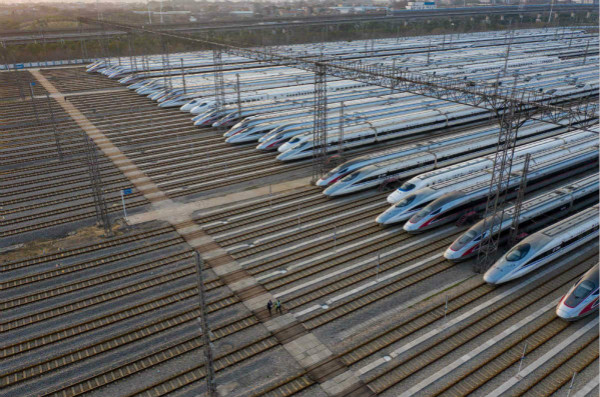14th Five-Year Plan: Institutional advantages herald promising future for China's centennial goal

China's infrastructure were successfully updated over the past decades. By 2019, China keeps the world's largest high speed rail (HSR) network with a length totaling over 35,000 km (21,750 mi). The world's longest HSR line, Beijing - Hong Kong High Speed Railway, extends 2,440 km. [Photo by China Daily]
Throughout China's long history, far-sighted policies backed by rational research and clear plans have been seen as the crucial impetus moving the nation's social and economic development forward. In the Confucian classic Doctrine of the Mean, Chinese scholars stressed that "preparation leads to success, while lack of planning results in failure."
This ancient wisdom has never gone out of fashion, especially when it comes to the governance of modern China. A leading global economic powerhouse, China has been issuing five-year policy plans since 1953, a move that has been hailed by experts worldwide as "China's secret weapon to ensure stable development."
In the past decades, these plans have transformed China from a backward nation into a prominent global power, lifting millions of its citizens out of poverty, creating unparalleled economic miracles, and building the world's most advanced and extensive infrastructure.
"If we compare countries to students in a class, China is that student who has caught up by setting long-term goals and achieving them with small plans," said Yan Yilong, a research fellow with the Center for China Studies at Tsinghua University.
The 14th Five-Year Plan (2021-25), which will be endorsed by the Party's Central Committee at the fifth plenum of the 19th Party Congress at the end of October, will lay out the blueprint for China as it embark on a new journey to build a great modern country and realize national rejuvenation amid growing external uncertainties.
Heading towards second centennial goal

Over the last five years, the Chinese economy has grown close to 100 trillion yuan (about 15 trillion U.S. dollars) with a per capita GDP exceeding 10,000 U.S. dollars. The share of China's economy in the world hit 16.3 percent in 2019. [Photo by xinhua]
The upcoming 14th Five-Year Plan will be the first after China accomplished building a moderately prosperous society in all respects and realizing its first centennial goal in 2020, as well as making all-out efforts to achieve its second centennial goal - building a great modern socialist country by around 2049.
The "two centennial goals" refer to building a moderately prosperous society in all respects by the centennial of the CPC, which was established in 1921, and building a modern socialist country that is prosperous, strong, democratic, culturally advanced, harmonious and beautiful by the centennial of the People's Republic of China, which was founded in 1949.
"Drawn up at the intersection of the two centennial goals, the 14th Five-Year Plan will set the tone and lay the foundation for building a great country," said Zhang Xixian, a professor at the Party School of the CPC Central Committee in Beijing.
According to experts, in addition to providing general guidance for the nation's future development, the 14th five-year plan is also akin to a super policy package setting quantitative indexes for a number of fields, including economic growth and environmental protection, as well as listing major programs and infrastructure projects that will impact people's livelihoods.
Institutional advantages

Night view of Beijing Central Business District. During the 13th Five-Year Plan period, from 2016 to 2019, China's industrial added value rose from 3.7 trillion U.S. dollars to 4.7 trillion, with an average annual growth of nearly six percent. That's higher than the global average of just under three percent for the same period. [Photo by Yang Tiehu, People's Daily Online]
China now has the world's largest middle-income population and is set to end absolute poverty, which has haunted the nation for thousands of years.
Chinese President Xi Jinping in August reiterated the importance of adopting a long-term perspective, grasping the trend of the times and extensively pooling wisdom to study new circumstances and make new plans, adding that formulating and implementing the five-year plans are important ways for the Communist Party of China to govern the country.
"By making plans in five-year intervals, Chinese authorities can allocate resources and investment from a long-term perspective, and also cope with challenges and changes in a more timely and effective way," said Yan.
Previous five-year plans have contributed to China's remarkable economic rise. During the 12th Five-Year Plan, for instance, the nation was able to update its infrastructure construction, with railways reaching 121,000 kilometers and the establishment of the world's largest 4th Generation mobile communication network, paving the way for China's booming infrastructure development.
"Five-year plans maintain the consistency of policymaking and combine the superiority of socialist society with the market economy, which is a great institutional advantage," added Yan.
The consistency of its policies and thoroughly tailored plans have been praised by economists worldwide. Nobel Laureate Professor Robert Engle in 2011 noted that "while China is making five-year plans for the next generation, Americans are planning only for the next election."
According to Zhang, making periodic plans can help China mitigate external impacts. Although the COVID-19 pandemic dealt a heavy blow on China, further damage to the nation's social and economic development is now under control. The government's swift adjustment to the pandemic situation has shown the world the importance of "adopting a long-term perspective, grasping the trend of the times."
"Combining practices and theories and evolving with the times are the advantage of CPC governance," said Yan.
























